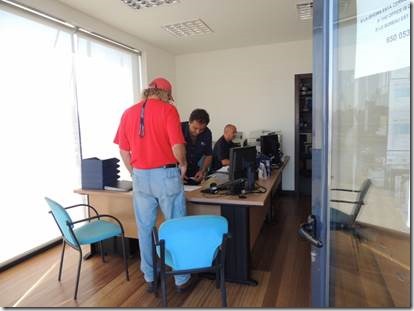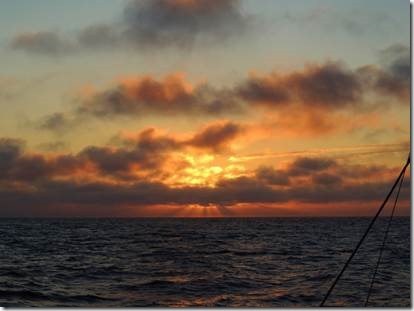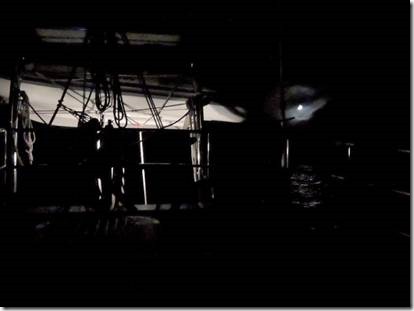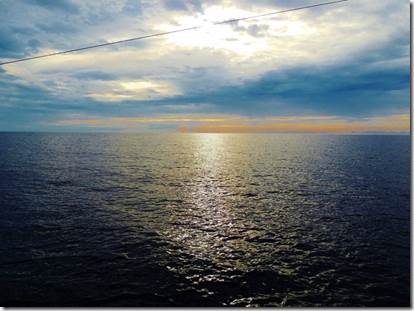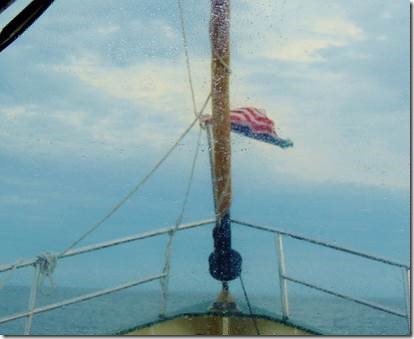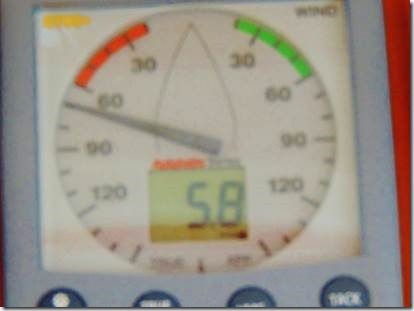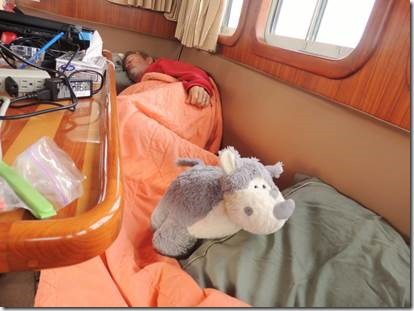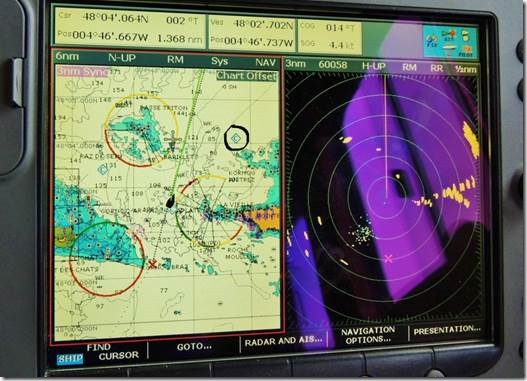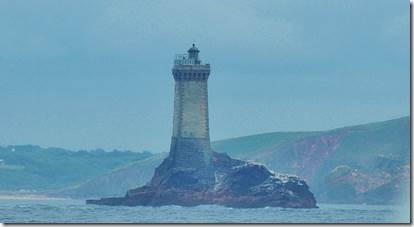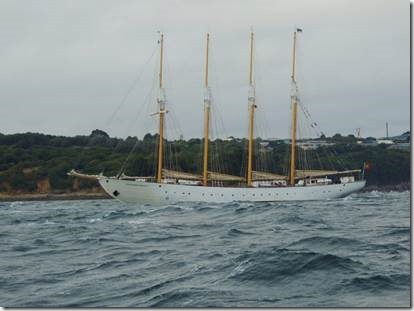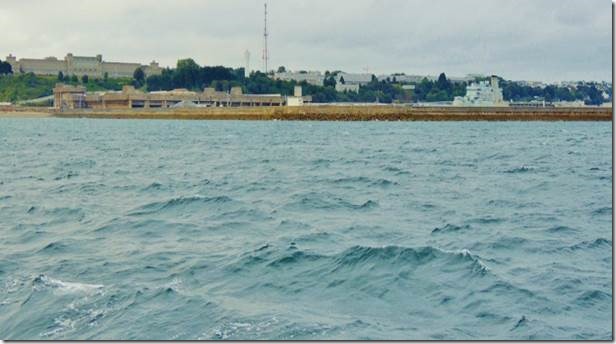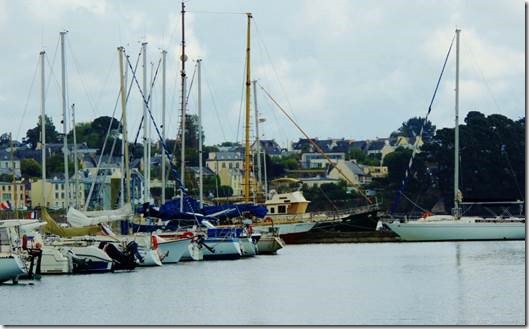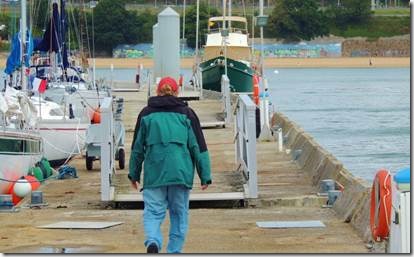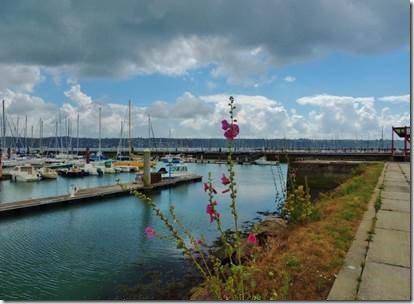Bonjour,
My mostly forgotten school French has little chance here unless people speak very very slowly. Then I might catch a few words. Thankfully the kind young woman in the marina office speaks English as did the wait staff at the Le Tour du Monde restaurant where we ate lunch. Probably we’ll have dinner out too as we’ve no veggies or fruit and the grocery store closed at noon, too early for us to get there as we had other stuff to do this morning. Tomorrow we’ll stock up again and be off on Tuesday for Cherbourg, Normandy; our final stop in France before we cross the English Channel to Portsmouth. It will be an overnight passage to Cherbourg, but thank goodness only a long day trip to Portsmouth. I’m saving my worry about each of those passages until we actually start each one.
We had a minor GPS issue with the course over ground reading but could deal with it; and brilliant Randal has now figured out how to correct it.
I’m still a little tired but totally relieved that the Bay of Biscay is behind us.
Ru
“Introduction – Why is Biscay so feared?”
“Yachts going to (or returning from) the Mediterranean have the choice of using the French river and canal system, water and air draft permitting, or crossing Biscay – feared by many yachtsmen due to its legendary reputation. To a large extent this is a result of ships, in the days of square riggers, being unable to make way to windward having been driven into the Bay by the prevailing westerlies. In addition, the Atlantic swell can build up rapidly near the coast and a number of ports can become dangerous to enter or even inaccessible.
Modern yachts, with their much more efficient rigs and their engines, should not have the same problems – particularly if they use weather forecasts carefully. Nevertheless, there have been several occasions in recent years of yachts getting into difficulties, sometimes with fatal consequences. From the accounts that I have read, I believe that most of these problems were avoidable and that few were entirely a result of bad luck or even poor forecasts.
While we were waiting to cross Biscay in May 2000, two yachts arrived at Audierne having been caught in winds up to at least Force 9. One had left Finisterre with no forecast "it was a nice day with a southerly wind, so we left." The other left La Coruña with only the BBC 24 hour shipping forecast and no longer term outlook. Both were disasters that nearly happened.
In bad weather, Biscay can be as unpleasant as any stretch of sea anywhere. But, if you want to get to warmer climes, as we did, and having a draft of 2 metres, then crossing it becomes a must. Having had several years sailing in and around Biscay, having talked to others and being a (now long retired) weatherman, I will try to give some help to those wishing to follow in our wake but who may have been put off by its reputation. “
http://weather.mailasail.com/Franks-Weather/Crossing-Biscay-Meteorologists-Advice
Ithaca
Do not fear the Lestrygonians
and the Cyclopes and the angry Poseidon.
You will never meet such as these on your path,
if your thoughts remain lofty, if a fine
emotion touches your body and your spirit.
You will never meet the Lestrygonians,
the Cyclopes and the fierce Poseidon,
if you do not carry them within your soul,
if your soul does not raise them up before you.
C P Cavafy
Those words are from one of my favorite poems ever, fittingly a poem I first heard at Outward Bound right before we set off on our “final expedition.” Reverend Ken read at our wedding. Our friends Becky and Mike had it written in lovely calligraphy for us. It is framed and hanging in our tiny apartment at home. Maybe I need to hang it here in DoraMac to remind me as my soul did raise every possible kind of monster/disaster you could imagine. But we had prepared the boat and Randal had checked, double checked, and triple checked the weather. We’d survived the Indian Ocean crossing as well as Passage from Hell 2 from La Liῆea to La Coruῆa. So I should have set out with some peace of mind rather than all those horrible thoughts that mostly comes from stupidly watching The Perfect Storm.
I used to be braver. I used to like day passages and even night passages only scared me because I had too few boat driving skills. Now I can drive much better. Now I’m afraid of the weather, the boat having issues, both of us being seasick at the same time….and any number of other things. We are no longer cruising “the lands below the winds.” But maybe being scared is good as “there are old sailors and there are bold sailors, but there are no old bold sailors.” No one will ever accuse me of being a bold sailor!
|
Checking out, paying the bill, saying good-bye in La Coruña where the staff was so great and the city enchanting! |
|
Sunset our first night We’d managed to get through the day without needing our stabilizers which says something about how bad it wasn’t but that didn’t relieve my fears one bit. |
|
Night with a half moon and stars and our mast light to make us visible. Spain and France are UTC + 2, but Spain is further west so it gets light after 7 AM but stays light until past 10 PM. With few clouds the first night it was rarely totally pitch-black dark. |
|
Sunrise day 2 : red sky in morning…but not until almost 7:30 AM….sailors take warning. Sort of true as we had to put out the stabilizing fish our second day to counteract the roll from the 2 meter swells hitting us on our beam. |
|
Thankfully winds were calm: you can see the pattern on our wind indicator bandana. |
|
Only 5.8 knots from the west/north Our passage from La Linea to La Coruna had 25 knot winds, yuck! |
|
My two Randals Two hours on and two hours off for most of the first day since the rolling really puts you to sleep and it’s more comfortable lying down with your eyes closed. We sleep in the pilot house when we’re off watch. When I’m off watch and lying down I don’t worry so it’s ridiculous to worry when I’m sitting up with my eyes open. But that’s the way it is. I hold on to Rhino Randal during my night watches. From my passage journal… Looking out over a vast ocean and seeing nothing except a six foot high swell of water coming at you. From the front, will it pound the boat to pieces? From the side, will it roll the boat over a la Perfect Storm? How to deal with fear while sitting watch: Eat crackers or chips! Or read to keep my mind busy. (I actually could read this passage so how bad could it be, really? Hold Rhino Randal. Off watch: Lay down with your eyes closed. If you can’t see it, it can’t hurt you. Hold Rhino Randal. |
|
Going into Brest I circled the Blue C in the diamond which indicates strong currents which can slow you down or bounce you around. It slowed us down to less than 5 knots so the last 10 miles took forever! |
|
Light house entering the channel up to Brest; somehow comforting as the waves weren’t breaking over the rocks which it can at times. |
|
This huge sailboat was heading off to Spain : see how choppy! We had to fight against it and then anchor to pull up the stabilizing fish from the water. Not easy at all. |
|
Sad image of WW 2 history in Brest which we passed on our way to the Moulin Blanc Marina. U-boat Pens and I believe the former Naval College (L’ Ecole Navale) in Brest, from 1941 headquarters of the 1st Flotilla “The RAF (and from 1943 also the USAAF) attacked the base and the bunker from January 1941 over 80 times and lost more than 50 aircraft during the attacks. But the first successes against the bunker finally came during August 1944, when the RAF (617th Squadron) attacked the bunker at Brest with Lancasters carrying 12,000 pound Tallboy bombs (6,4 meter length). The attacks came on August 5, 12 and 13 and all in all 26 aircraft dropped one such bomb each at the bunker, scoring 9 direct hits and a few near-misses. Of those only 5 actually penetrated the massive roof and caused surprisingly little damage inside the bunker and none to the U-boats there. The last U-boat to leave Brest was U-256 which had been repaired hastily and was commanded by the Flotilla Commander, Korvkpt. Lehmann-Willenbrock which took the boat out from Brest on 4 Sept and managed to bring the boat the Bergen, Norway on 17 October. Both Flotillas were disbanded in September and thus all U-boat activity ceased at the base. Brest was captured by the allied forced on September 21, 1944 after a fierce month-long battle which caused US forces over 10,000 causalities and almost wiped out the entire town. “ |
|
DoraMac tied to the visitor berth. Water separates DoraMac from those buildings; just hard to tell from this perspective. The office had closed at 8 PM and we called the marina at 8:30 after wrestling with the paravane fish. No one was there to help so Randal pulled up very close to the dock and I jumped off and boat hooked the lines and then tied us up. Whew weee! |
|
DoraMac on the visitor berth at the far FAR end of the marina. But the wifi seems good so that’s all that matters and we don’t have to tie stern-to. And we’re away from the restaurants/bars with any possible noise that can bring. If there was any last night we never heard it for we were both out cold by 10 PM! |
|
Walking back from lunch at Le Tour du Monde. After lunch I walked along the greenway that follows the water. There were hundreds of people out there which was nice to see. |

